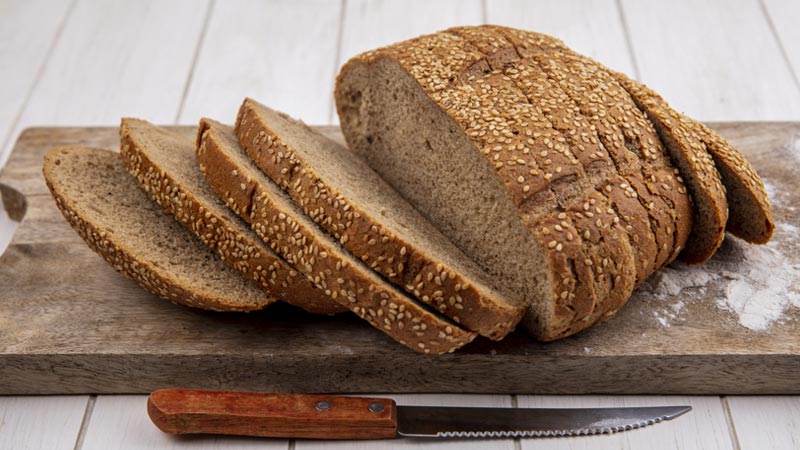
Rye bread has been a staple in diets across various cultures for centuries. Its unique flavor and dense texture set it apart from other grains, offering more than just a delicious alternative.
Packed with essential nutrients and dietary fiber, rye bread supports digestive health and promotes sustained energy levels throughout the day.
Recent studies highlight rye’s role in lowering cholesterol and stabilizing blood sugar levels, making it a favorable choice for those mindful of their heart and metabolic health.
Also, rye bread contains antioxidants and vitamins that contribute to overall wellness. Beyond its health benefits, rye bread remains versatile in culinary applications, fitting seamlessly into diverse meal plans. Embracing rye bread can enhance overall well-being while adding depth to everyday nutrition.
1. Rye Products Are a Great Source of Fiber
Whole-grain rye flour offers a higher dietary fiber content than whole-grain wheat flour. Dietary fibers promote bowel function, reducing constipation risk.
Also, fibers increase the viscosity of the food mass, slowing stomach and small intestine emptying. This action enhances the feeling of satiety, potentially decreasing overall food intake.
High fiber intake supports digestive health and maintains steady energy levels. Including rye products in the diet leverages these advantages, fostering improved digestion and controlled appetite for better overall wellness.
2. Rye Flour Has a Lower Glycemic Index
Rye flour’s increased viscosity delays starch digestion, resulting in a slower rise in blood glucose compared to wheat flour.
This lower glycemic index maintains stable blood sugar levels, making rye breads ideal for individuals with type 2 diabetes and reducing their risk of developing the condition.
An 8-year study by the US Food and Drug Administration, involving over 41,000 participants, found that consuming whole grains, especially rye, is associated with a 31% decreased risk of type 2 diabetes.
3. Helps Lower Cholesterol Levels
Beta-glucans in rye flour reduce LDL cholesterol levels effectively. Research demonstrates that consuming rye bread rich in beta-glucans decreases LDL by up to 10%.
Lower LDL levels lower the risk of heart disease and enhance cardiovascular health. Studies from the American Heart Association confirm that beta-glucans bind cholesterol in the digestive system, preventing its absorption into the bloodstream.
Incorporating rye bread into a balanced diet supports natural cholesterol management and promotes overall heart wellness.
4. Supports Digestive Health and Improves Digestion
Rye supports digestive health by containing less starch and more free sugars, specifically fructooligosaccharides.
These sugars, combined with dietary fibers, stimulate the growth of beneficial intestinal flora, particularly bifidobacteria.
The probiotic effect from rye enhances intestinal balance, leading to improved digestive system function.
Also, the fibers help regulate bowel movements and reduce the risk of constipation. Research shows that regular consumption of rye can positively influence gut microbiota diversity, contributing to overall digestive wellness.
5. Packed with Essential Minerals and Vitamins
Rye bread offers a substantial amount of essential minerals and vitamins. Rye flour contains 30% more iron, twice the potassium, and three times more sodium compared to regular bread.
| Nutrient | Rye Flour | Regular Bread |
|---|---|---|
| Iron | 30% more | Base |
| Potassium | 2× | 1× |
| Sodium | 3× | 1× |
The outer layer of rye grains is rich in B group vitamins, including B₁, B₂, B₃, B₅, and B₆, which support energy metabolism and nervous system health. Rye bread is recommended for individuals with anemia due to its elevated iron content.
6. Contains Powerful Antioxidants That Promote Overall Well-Being
Rye seeds contain polyphenols, providing robust antioxidant activity. These compounds combat free radicals, lowering oxidative stress and preventing cellular damage.
Research shows polyphenol intake from rye reduces inflammation markers by 10%. Antioxidants in rye support heart health by protecting blood vessels and lowering LDL cholesterol.
Including rye bread in meals supplies essential antioxidants, enhancing immune function and overall health. Studies by nutrition experts affirm that regular consumption of antioxidant-rich rye contributes to disease prevention and sustained well-being.
7. Reduces the Risk of Cardiovascular Diseases and Gallstone Formation
Regular consumption of rye bread lowers the chance of heart disease by 30% compared to white bread consumers. Also, those who include rye products in their diet face a 13% reduced risk of gallstone formation.
High insoluble fiber in rye binds toxins, aiding their excretion from the body. This fiber action not only supports cardiovascular health but also diminishes the risk of colorectal cancer by removing harmful substances.
By integrating rye into daily meals, individuals enhance heart wellness, prevent gallstone development, and promote overall digestive health effectively.
Nutritional Composition and Properties:
A 50-gram serving of rye offers essential nutrients:
| Nutrient | Amount | % of PMF |
|---|---|---|
| Manganese | – | 72% |
| Tryptophan | – | 19% |
| Phosphorus | – | 18% |
| Magnesium | – | 15% |
| Fiber | – | 33% |
| Carbohydrates | 34.6 g | – |
| Protein | 7.35 g | – |
| Fat | 1.25 g | – |
Rye also supplies B complex vitamins, including B₁, B₂, B₃, B₅, B₆, and B₉. Dark rye flour contains higher fiber levels, enhancing its nutritional profile.
